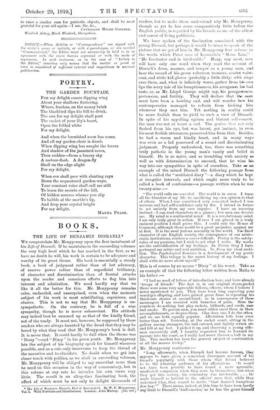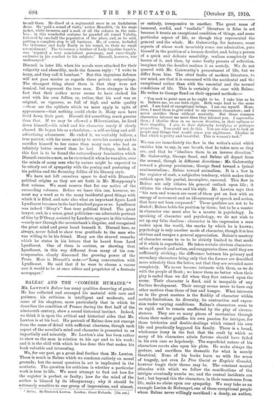1300 KS.
THE LIFE OF BENJAMIN DISRAELI.*
WE congratulate Mr. Monypenny upon the first instalment of his Life of Disraeli. If he maintains in the succeeding volumes the very high level which he has reached in the first, as we have no doubt be will, his work is certain to be adequate and worthy of its great theme. His book is essentially a steady book, a book of judgment rather than of hot advocacy, of reserve power rather than of superficial brilliancy, of character and discrimination than of frontal attacks upon the reader and conscious efforts to flog him into interest and admiration. We need hardly say that we like it all the better for this. Mr. Monypenny remains calm, undazzled, and unsurprised, even when the meteoric subject of his work is most scintillating, capricious, and elusive. This is not to say that Mr. Monypenny is un- sympathetic. On the contrary, he is full of a wise sympathy, though he is never subservient. His attitude may indeed best be summed up as that of the kindly friend, not of the toady. It must not, however, be supposed by those readers who are always haunted by the dread that they may be bored by what they read that Mr. Monypenny's book is dull. It is never that. It could hardly be dull when the theme was "Dizzy "—and " Dizzy " in his green youth. Mr. Monypenny lets the subject of his biography speak for himself wherever possible, and as a rule only intervenes to keep the thread of the narrative and to elucidate. No doubt when we get into closer touch with politics, as we shall in succeeding volumes, Mr. Monypenny will be obliged to say somewhat more than he need on this occasion in the way of commentary, but in this volume at any rate he intrados his own views very little. The result is an altogether fascinating book, the effect of which must be not only to delight thousands of • The Life of Benjamin Disraeli, Earl of Beacms.field. By W. F. Monypenny. Vol. L With Portraits and Illustrations. London: John Murray. [Us. net.]
readers, bat to make them understand why Mr. Monypenny, though as yet he has come comparatively little before the English public, is rega.nled by his friends as one of the ablest and sanest of living publicists.
We have spoken of the fascination associated with the young Disraeli, but perhaps it would be truer to speak of the picture that we get of hint in Mr. Monypenny first volume in the words which Pater uses of Leonardo's " Mona Lisa,"-- - "He fascinates and is intolerable." Many, nay most, men will have only one word when they read the account of Disraeli's dress, manner, and temper as a young man, and hear the record of his green velveteen trousers, scarlet waist- coat, and white kid gloves (probably a little dirty) with rings over them, and, what is infinitely worse, gather from his own lips the sorry tale of his bumptiousness, his arrogance. his bad taste, or, as Mr. Lloyd George might say, his pompousness, pretension, and futility. They will declare that the man must have been a bowling cad, and will wonder how his contemporaries managed to refrain from kicking him whenever they met him. Yet nothing in reality could be more foolish than to yield to such a view of Disraeli. In spite of his appalling egoism and blatant self-conceit, the man was not at heart a cad. The genius that not only flashed from his eye, but was latent, yet Instinct, in even his most foolish utterances, preserved him from that. Besides, he had a warm and kindly heart, and in many ways was even as a lad possessed of a sound and discriminating judgment. Properly understood, too, there was something truly pathetic in the young man's vanity and belief in himself. He is so naive, and so trembling with anxiety as well as with determination to succeed, that he wins his way into our sympathies in spite of ourselves. Take as an example of the mixed Disraeli the following passage from what is called the "mutilated diary "—a diary which he kept at irregular intervals, and which ought more truly to be called a book of confessions—a passage written when he was twenty-nine :— "The world calls me conceited. The world is in error. I trace all the blunders of my life to sacrificing my own opinion to that of others. When I was considered very conceited indeed I was nervous and had self-confidence only by fits. I intend in future to act entirely from my own impulse. I have an unerring instinct—I can read characters at a glance ; few men can deceive me. My mind is a continental mind. It is a revolutionary mind. I am only truly great in action. If over I am placed in a truly eminent position I shall prove this. I could rule the House of Commons, although there would be a great prejudice against me at first. It is the most jealous assembly in the world. The fixed character of our English society, the consequence of our aristo- cratic institutions, renders a career difficult. Poetry is tho safety- valve of my passions, but I wish to act what I write. My works are the ernbodification of my feelings. In Vivian Grey I have portrayed my active and real ambition. In Alroy my ideal ambi- tion. The Psychological Romance is a development of my poetic character. This trilogy is the secret history of my feelings. I shall write no more about myself."
This is of course by no means "Dizzy" at his worst. Take as an example of that the following letter written from Malta to his father :-
"I had no need of letters of introduction here, and have already 'troops of friends.' The fact is, in our original steam-packet there were some very agreeable fellows, officers, whom I believe I never mentioned to you. They have been long expecting your worship's offspring, and have gained great fame in repeating his third-rate stories at second-hand: so in consequence of these messengers I am received with branches of palm. Here the younkers do nothing but play rackets, billiards, and cards, race and smoke. To govern men, you must either excel them in their accomplishments, or despise them. Clay does one, I do the other, and we are both equally popular. Affectation tells here even better than wit. Yesterday, at the racket court, sitting in the gallery among strangers, the ball entered, and lightly struck mile and fell at my feet. I picked it up, and observing a young rifle- man excessively stiff, I humbly requested him to forward its passage into the court, as I really had never thrown a ball in my life. This incident has been tho general subject of conversation at all the messes to-day."
Mr. Monypenny continues :—
"Long afterwards, when Disraeli had become famous. Clay appears to have given a somewhat discrepant account of his friend's popularity with those whom that friend believed to be the admiring audience of his affectations. 'It would not have been possible to have found a more agreeable, unaffected companion when they were by themselves; but when they got into society, his coxcombry was intolerable. . . made himself so hateful to the officers' mess that, while they welcomed Clay, they ceased to invite "that damned bumptious Jew boy." There seems, indeed, at this time to have been hardly any limit to Disraeli's 'buffooneries,' as he has the grace himself to call them. He dined at a regimental mess in an Andalusian dress. He 'paid a round of visits,' writes Meredith, in his majo jacket, white trousers, and a sash of all the colours in the rain- bow ; in this wonderful costume he paraded all round Valetta, followed by one-half the population of the place, and, as he said, putting a complete stop to all business. He, of course, included the Governor and Lady Emily in his round, to their no small astonishment.' The Governor, a brother of Lady Caroline Lamb's, was reputed a very nonchalant personage, and exceedingly exclusive in his conduct to his subjects.' Disraeli, however, was undismayed."
Disraeli in later life, when his novels were attacked for their vulgarity and absurdity, made the famous reply : "I write in
irony, and they call it bombast." But this ingenious defence will not pass muster as regards these private outpourings.
The strangest thing about them is that they were not ironical, but represent the true man. Even stranger is the fact that their author never seems to have choked his soul with his own follies, or, rather, that his soul was so original, so vigorous, so full of high and noble quality —these are the epithets which we must apply in spite of appearances—that nothing could choke it. Many men have lived down their past. Disraeli did something much greater than that. If we may be allowed a Hibernianism, he lived down himself,—his mind and his character surely if slowly cleared. He began life as a charlatan,—a self-seeking and self.
advertising adventurer. He ended it, we veritably believe, a true patriot, with far more anxiety to serve his country and to sacrifice himself to her cause than many men who had an infinitely better record than he had. Perhaps, indeed, in this fact is to be found the extraordinary fascination which Disraeli exercises now, as he exercised it when he was alive, over the minds of many men who by nature might be expected to be utterly out of sympathy with the posing and posturing of his politics and the flaunting follies of his literary style.
We have not left ourselves space to deal with Disraeli's political origins as they are set forth in Mr. Monypenny's first volume. We must reserve that for our notice of the succeeding volumes. Before we leave this one, however, we must say a word as to the many incidental good things with which it is filled, and note also what an important figure Lord Lyndhurst becomes in the last hundred pages or so. Lyndhurst was indeed "Dizzy's" first true political friend. The great lawyer, and, in a sense, great politician—an admirable portrait of him by D'Orsay, assisted by Landseer, appears in this volume —early saw through the mountebank's disguise, and recognised the great mind and great heart beneath it. Disraeli here, as always, never failed to show true gratitude to the man who was willing to be his friend. Many are the shrewd remarks which he states in his letters that he heard from Lord Lyndhurst. One of them is curious, as showing that Lyndhurst, in this way different from many of his con- temporaries, clearly discerned the growing power of the Press. Here is Disraeli's note :—" Long conversation with Lyndhurst. He said that if he were to choose a career now it would to be at once editor and proprietor of a firstrate newspaper."















































 Previous page
Previous page